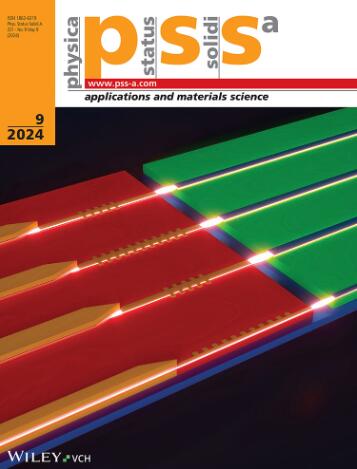射频磁控溅射法生长的掺铌氧化锌薄膜中捐献者缺陷诱导的铁磁性
IF 1.9
4区 材料科学
Q3 MATERIALS SCIENCE, MULTIDISCIPLINARY
Physica Status Solidi A-applications and Materials Science
Pub Date : 2024-08-13
DOI:10.1002/pssa.202400219
引用次数: 0
摘要
研究了掺铌浓度(0、1、2 和 4%)对氧化锌薄膜中供体缺陷诱导铁磁性的影响。薄膜通过射频磁控溅射沉积在 Si(111) 基底上。X 射线衍射图揭示了薄膜沿 (002) 方向的明显取向。光致发光(PL)光谱中缺陷相关波段与紫外波段的相对强度表明,2 at.%的铌掺杂导致氧化锌晶格中存在更多的供体缺陷(Zni+ 和 VO+)。从电子顺磁共振光谱中提取的参数也呈现出类似的趋势。振动样品磁力计测量结果表明,纯氧化锌具有二磁性,而掺铌氧化锌则具有铁磁性。掺杂 2 at.%掺杂铌时,饱和磁化值最高,这与存在更多的供体缺陷有关,这也得到了聚光效应和电子顺磁共振结果的支持。原子力显微镜获得的图像显示,掺入铌后,氧化锌薄膜的表面粗糙度降低。X 射线光电子能谱验证了在 2 at.%掺铌氧化态为 +5的氧化锌薄膜中。本文章由计算机程序翻译,如有差异,请以英文原文为准。
Donor Defect Induced Ferromagnetism in Nb‐Doped ZnO Thin Films Grown by RF Magnetron Sputtering
The effect of Nb doping concentration (0, 1, 2, and 4 at. %) on donor defect‐induced ferromagnetism in ZnO thin films is investigated. The films are deposited on Si(111) substrates utilizing the radio frequency magnetron sputtering. X‐ray diffraction pattern unveils that the films show a pronounced orientation along the (002) direction. The relative intensities of defect‐related bands with that of the ultraviolet band from photoluminescence (PL) spectra show that 2 at. % Nb doping results in a greater number of donor defects (Zni + and V O + ) in the ZnO lattice. The parameters extracted from the electron paramagnetic resonance spectra follow a similar trend. The results from vibrating sample magnetometer measurement indicate that pure ZnO displays diamagnetic nature, whereas Nb‐doped ZnO exhibits a ferromagnetic nature. The saturation magnetization value is found highest for 2 at. % Nb doping, which correlates with the presence of a greater number of donor defects, as supported by the PL and electron paramagnetic resonance results. Images obtained from atomic force microscopy show that the surface roughness of the ZnO thin film reduces upon Nb doping. X‐ray photoelectron spectroscopy validates that Nb is doped in 2 at. % Nb‐doped ZnO thin film with Nb oxidation state of +5.
求助全文
通过发布文献求助,成功后即可免费获取论文全文。
去求助
来源期刊
CiteScore
3.70
自引率
5.00%
发文量
393
审稿时长
2 months
期刊介绍:
The physica status solidi (pss) journal group is devoted to the thorough peer review and the rapid publication of new and important results in all fields of solid state and materials physics, from basic science to applications and devices. Among the largest and most established international publications, the pss journals publish reviews, letters and original articles, as regular content as well as in special issues and topical sections.

 求助内容:
求助内容: 应助结果提醒方式:
应助结果提醒方式:


